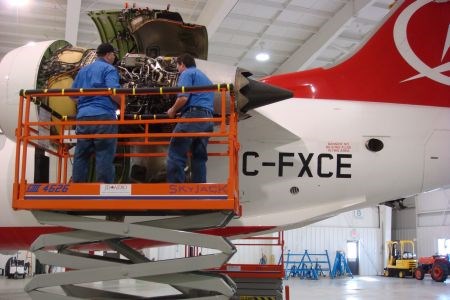Sunnier skies appear to be on the horizon for a Sault Ste. Marie aircraft refurbisher.
The recent recession cut deep into the aviation sector, causing some large aircraft maintenance, repair and overhaul shops to go out of business.
However, it’s opened up doors for smaller players like JD Aero Technical to pick up international work.
This summer, the company based at the Sault Ste. Marie Airport has eight Canadair 200s (CRJ) parked on its apron.
Chief Operating Officer Don McNabb said they are storing them for a United Kingdom bank which leased them to Mesa Air Group of Phoenix, Arizona. With the lease expiring and Mesa under Chapter 11 bankruptcy, the fleet was drawn down and planes were shed.
The aircraft were brought to the Sault for storage. Some planes may be re-marketed to another carrier, but most will be disassembled and used for parts. The company plans to remove between 750 and 1,000 parts such as electronic boxes, landing gears, and auxiliary power units from each aircraft before it’s crushed for scrap. JD Aero will ship the parts to a U.S. company for re-marketing.
JD Aero Technical specializes in regional airplanes, particularly Dash 8 and CRJ-series aircraft. They opened for business in the Sault in the winter of 2008, moving into a vacant 30,000-square-foot hangar and office space.
The company is a Northern Ontario offshoot of their original Toronto-area business, JD Aero Maintenance, which carries out new aircraft inspections and project management work. The technical spinoff company is certified in North America and the European Union countries to work on all Dash 8 and CRJ series aircraft, plus aircraft structural repairs.
The bulk of their clients are national and international firms such as Porter Airlines, Bombardier Asset Management Group and DVB Bank, although they handle line support for carriers like Bearskin and Air Jazz on an ad-hoc basis.
Last winter, the company performed heavy maintenance for Porter Airlines aircraft last winter and will be doing support work this summer for their flight management system upgrades either at the Sault base or at Porter’s flight hub at Billy Bishop Airport on Toronto Island.
They are also working for Mozambique Airlines.
Two technicians are in the African nation supporting the carrier’s line maintenance program. Some planes will be ferried to the Sault for heavy maintenance checks.
The company also employs mobile field crews and can send contract technicians to other airlines and maintenance facilities.
McNabb said the high Canadian dollar has made them less competitive against similar U.S. firms so they keep tabs on cost overruns and try to offer as many incentives as possible. To ensure they are not prone to currency fluctuation, the company’s quotes are in Canadian dollars.
During peak periods, the seven-employee company expands its workforce to 30 people on major projects.
McNabb said for the CJR parts jobs, they will be running a crew of 10 for a fivemonth period, many being drawn from skilled labour in the community.
“We’ve been quite lucky. There’s a good base of aviation manpower in the Sault.”
Many are retired from the Ministry of Natural Resources, private aviation outfits or were previously employed in the cyclical aircraft refurbishment business.
Coming out of the recession, work is starting to pick up, McNabb said.
“It was really slow from mid-2008 to early 2009. We had the odd project at the hangar but it was basically road work that kept us going.”
To cut costs, many carriers were mandated to keep repair work in-house and avoid contracting out to third parties.
“So far this year, things have been fairly steady and it’s moving along quite well,” said McNabb. “Porter was a big boost for us earlier this year.”
Because their labour rates and employment costs are less than European maintenance companies, McNabb said they can compete with international projects from lower Africa and South America since the ferry distance is roughly the same either to Canada, the U.S. or Europe.
McNabb said one area for growth is corporate aviation services. The company hopes to soon become a fixed based operator that can handle transient business aircraft by opening up their hangar lounge for stopovers, refueling and any repairs.
He has no regrets about setting up shop in the Sault.
“The location is good because it’s central North America coming from the east or west or from down south. It’s good being close to the border and we have a good working relationship with Canada Customs getting parts in and out.”
Their long-term goal is to grow out its Sault presence and eventually staff up its workforce to 50. McNabb said they hope to develop a pipeline of graduates from aviation programs at Thunder Bay’s Confederation College and North Bay’s Canadore College.




